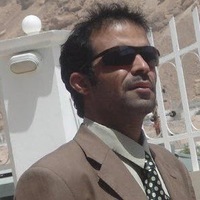The humorous tale, “The General Secretariat of Speedbumps,” by Hayel al-Mathabi, translated by Christiaan James, was taken from the anthology of short stories Tales of Sana’a, published by Comma Press in April. Wasta and nepotism are at the heart of this short story by Yemen’s most prolific writer, theatre critic, and journalist.
Translated from the Arabic by Christiaan James
It is an indisputable fact that the mayor of the capital, Mr. Amin Sa’dan, was one of very few men recognized for his unyielding integrity and exacting moral rectitude, for it was he who absolutely refused to appoint his wife’s brother, Sami Sarhan, as a bureaucrat within the Capital Municipality till all legally mandated measures had been carried out. And so, summoning forth the director general for administrative affairs of the municipality, Mr. Amin conveyed to him his desire to find a suitable position for his brother-in-law.

Proud as could be, the director general for administrative affairs circled back to Mayor Sa’dan, informing him that he had indeed identified a vacant position for Sami: engineering director for the Office of Roadways at the municipality. Mayor Sa’dan noted: “While it is accurate to say that Sami does not hold a bachelor’s degree in engineering per se, he does however have a B.A. in literature from the Department of History,” to which the director general confirmed that this very engineering position specifically called for an undergraduate degree in literature from a history department.
And so, just days later, a job advert from the capital municipality appeared in the newspapers:
The Capital Municipality of Sana’a hereby announces a vacancy for Director of Engineering within the Office of Roadways subject to the following conditions:
Applicants for this engineering position must hold a bachelor’s degree in literature from the University of Sana’a, Faculty of Literature (Department of History), Cohort 35, Class of 2003. Any applicant holding an engineering degree is hereby excluded and will not be considered;
At the time of the personal interview, the applicant must be 24 years, three months, and 11 days old;
The applicant must wear glasses and have a neck mole directly below the left ear;
The applicant must have undergone a tonsillectomy on January 4, 1996 at Al-Thawra Hospital in Sana’a;
Height must measure exactly 174 centimeters;
Applicant shall reside on Hadda Street and his municipality-issued ID card must be 5532;
His name must be Sami Sarhan, and;
He must have a brother two years his junior named Hani Sarhan.
These conditions having been met, a personal interview will be arranged for applicants on the 17th September. The top candidate will enter in as a Schedule 5 appointee with the following employment-based compensatory allowances: 10,000 riyals for streets; 15,000 riyals for pavements; 10,000 riyals transportation allowance; 10,000 riyals for non-transportation allowances; and 20,000 riyals for finding oneself on streets far removed from his residence.
The ever-so-scrupulous Amin Sa’dan expressed his utter astonishment to the director general for administrative affairs when no one put forth their application for the position save one person: Sami Sarhan. Mr. Amin underscored and stressed that to ensure equal opportunity for all (as stipulated by law) he had widely circulated the advert in the papers. So why then had applicants refrained from applying?!
The director general for administrative affairs was even more perplexed than he was. His lips pursed, he said to the capital mayor: “Wallahi, I have no clue, Ustaaz [Mister] Amin!”
And so Sami sat before the interview committee which had codified a fair and objective system whereby each question would be allocated ten marks. The committee’s first question for Sami was whether he had at times walked along Mohammed Mahmoud Al-Zubairi Street.
Answering affirmatively, a committee member probed further:
“After which of the revolutionaries was Zubairi Street named?”
Sami responded, “Leader Al-Sallal.”
Letting out a knowing laugh, another panellist explained to the rest of the members what Sami Sarhan had intended to say. Simply put, Zubairi Street had initially been named after Leader Al-Sallal and that, although the street was now named after Zubairi, Sami meant that it had originally been named in honor of Al-Sallal.
Questions from the interview committee continued to flow, one right after the other:
“How are you, Mr. Sami?”
To which he responded: “May God protect you.”
Here the committee marked down another ten points for the correct answer.
“What is your full tripartite name, Mr. Sami?”
“Sami Khalil Sarhan.”
The committee notated an additional ten marks.
“What time is it, Mr. Sami?”
‘It’s a quarter to 11.”
Ten more points for an accurate response.
“What’s your address, Mr. Sami?”
“Hayy Al-Medina, Hadda Street.”
Ten marks for yet another spot-on answer.
So Sami became director of engineering in the Office of Roadways Administration at the Capital Municipality of Sana’a. And though he held just a bachelor’s degree from a history department, his official title was elevated to Engineer Sami Sarhan, after which official correspondence began to arrive at the municipality addressed to Mr Historical Engineer Sami Sarhan, Director of Engineering.
And so events progressed and everything would have passed smoothly had it not been for that idiot Naji Hassan, currently serving as undersecretary for the Legal Affairs Department. Naji Hassan was an engineer and had received engineering degrees from universities in Sana’a and Germany, advancing within the municipality till finally becoming head of the Department of Engineering in the Office of Roadways. When the mayor first had approached the director general for administrative affairs about finding a job for Sami, the very next day the director made a surprising observation, something he had not noticed before: Engineer Naji Hassan was incompetent at his job, as head of engineering, and was summarily transferred to serve as head of the legal department, where he could show his chops as a bureaucrat in legal affairs. However, he failed miserably at writing briefs. A compassionate man, Mayor Sa’dan advised giving Naji Hassan a third chance to prove his salt and thus got him transferred to take charge of the medical department. However, it was absolutely lamentable that here, a man, on whom the state had expended so much to pursue studies at the largest university in Germany, had not a clue how to use a stethoscope to examine patients, nor did he have the slightest idea how to operate a blood pressure machine or even— in the absence of an attending nurse — administer a jab to a patient at an external clinic. All that, despite the fact that the municipality had in no way skimped on or short-changed him in the least, having put at his disposal a vehicle adorned with Red Crescent license plates in order to examine municipality patients at their homes, and even provided him with an operating theatre equipped with the latest in surgical gadgetry. Yet, despite it all, he refused to perform an appendectomy on a functionary in a critical condition whose appendix was about to burst. Out of laziness and inaction, he transferred the worker to the general hospital where he died.
Based on such incompetency and malpractice, the mayor could have shown Engineer Naji Hassan the door, but the gentleman was truly merciful and saw it only right to offer him a fourth chance, reinstating him as undersecretary of legal affairs. The head of the legal department was consequently shuffled over to the Department of Electrical Units whereafter Mahmoud Saleh, the accountant, took up the reins at Medical. Undoubtedly, through such directives, Mayor Sa’dan offered excellent opportunities to those underperforming at one post to shine in another where their talents might be better suited.
Some felt that Engineer Naji Hassan was an obnoxious, ungrateful man, entirely unappreciative of the mayor’s humane touch, and he openly cursed Amin Sa’dan all over town. However, the director general for administrative affairs discovered that it was not a matter of ingratitude or boorishness, but rather a mental defect. The director general revealed to Amin Sa’dan that he had walked in on Engineer Naji Hassan only to discover him talking to himself, raving madly in strange, incomprehensible gibberish. Immediately, Amin Sa’dan summoned Mahmoud Saleh, the sometime accountant now head of the medical department. He ordered him to place Engineer Naji Hassan, head of legal affairs, under medical observation and to urgently draft a medical report on the state of his mental health. Amin Sa’dan assured Mahmoud the accountant that a successful undertaking of this assignment would confirm his impeccable medical competencies and just might qualify him to assume the role of DG for administrative affairs that would soon be vacated following the appointment of the current director as director general of the capital municipality itself.
Mahmoud Saleh the accountant left Amin Sa’dan’s office gung ho to prove his fitness as the Medical Department director. Several days later, he returned with his clinical assessment of Engineer Naji Hassan’s mental state. He sat across from Amin Sa’dan, who held the report and skimmed what the accountant had drafted:
Mental Balance of Engineer Naji Hassan:
If we look at the capital as well as fixed and movable assets in the brain of Engineer Naji Hassan, and closely analyze the consumption rate of said capital, that being his head…
At which point, Mr Amin Sa’dan indignantly hurled the financial report of Engineer Naji Hassan’s mind and reamed into Mahmoud the accountant for his medical ignorance. Everything crescendoed till finally Mahmoud Saleh, the erstwhile accountant, was transferred over as technical advisor for the Department of Electrical Operations and the director of Mechanical Units took charge of Medical.
To take the wind out of loony Naji Hassan’s claim that Mayor Sa’dan had purloined his original position to give to his wife’s brother, it was decided a new General Administration for Speed Bumps should be set up, to be overseen (with rank of director general) by Historical Engineer Sami Sarhan.
Sent abroad on a delegation at the expense of the municipality, Historical Engineer Sami Sarhan returned a fully-fledged expert in the science of ‘Speedbumpology’, which he had studied while overseas. Sami Sarhan became something of a passing scientific sensation, for his historical the studies had played no small part in the development of Speedbumpology. With just one glance at any speed bump on any street in Sana’a, he could determine the bump’s age, the reason for it, and its history. Given the import of speed bumps in the lives of Yemenis today, Mayor Sa’dan established an institute annexed to the General Administration for Speed Bumps — The Higher Institute for Speed Bumps — wherein the institute’s dean, Historical Engineer Sami Sarhan himself, began delivering lectures to department employees and students alike who had enrolled in a course of studies.
With keen foresight, Mayor Amin Sa’dan decided to take pre-emptive steps to thwart any attempt to later pilfer speed bumps now that they had become a national and archaeological treasure, particularly so after the establishment of a specialized institute. And so to keep speed bumps under the exclusive purview of the Capital Municipality of Sana’a, Amin Sa’dan changed the municipality’s name to the General Secretariat for Speed Bumps!




